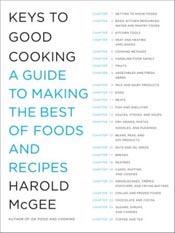I am not the world’s most impressive chef, but I’ve always wanted to be a good cook. I’ve debated signing up for cooking classes, but end up skipping it because of expenses or time.
As a cook I like to have recipes, but tend to not follow them exactly. It drives my boyfriend crazy when I don’t measure – too lazy to wash all the measuring utensils – or just guess on how long something should cook. This works out for me about half the time, and the other half I get a dish that doesn’t quite seem right.
The improviser in me was excited to see that Keys to Good Cooking by Harold McGee was going on a book tour in October, and e-mailed to ask if I could be a part of it.
As the introduction of the book explains, Keys to Good Cooking isn’t a cookbook:
Keys to Good Cooking is meant to be a constructively critical companion to your recipe collection and a guide to the kitchen, gadgets, ingredients, and techniques with which you turn recipes into foods. It’s a concise, up-to-date summary of the basic facts of food preparation. It provides simple statements of fact and advice, along with brief explanations that will help you understand why, and apply that understanding to other situations. It will help you evaluate recipes, recognize likely flaws or problems, and make adjustments and corrections as you cook. It will help you put aside recipes, improvise and experiment, and come up with your own better ways of doing things.
I think having some idea of what cooking terms mean and why recipes give the directions they do could be helpful for me as an aspiring better cook.
As part of the tour, we got a preview of the book, and are supposed to share a couple of tips we found helpful. With just 17 pages to look at, I already found quite a few things I didn’t know:
- Frozen vegetables can equal or better the quality of fresh, especially vegetables that lose flavor and tenderness rapidly after harvest. These include green peas, lima beans, and sweet corn.
- To make baked potatoes with a crisp skin, oil or butter potatoes before baking in a hot oven, 425-450°F/220-230°C. Baking without oil or in foil produces a leathery skin.
- The quality of cooked meat deteriorates in the refrigerator, even in a stew or other dish whose overall flavor may improve for a day or two. Freeze leftovers to keep them in good condition for more than a few days.
I should have the book soon, and a full review to post sometime in October. I’m looking forward to it!


Comments on this entry are closed.
I am like you, I don’t follow recipes exactly and it also drives my BF crazy. I will keep my eye out for your full thoughts on this one. I need more techniques and less following the rules cookbooks.
Gwen: That’s exactly what I was thinking — techniques, not rules — that way I can improvise and play around without messing things up so badly 🙂
Have fun with this. I always throw fresh fruits and veggies into the freezer if I know I won’t enjoy them before they go bad. It amazes me how many people throw away grapes or bananas when they are getting near ‘too’ ripe.
Care: See, I never thought/think about doing that. Of course things can just freeze if they’re going bad, but somehow that never clicks with me. I also lived in an apartment with a teeny tiny freezer, so that wasn’t possible all the time anyway. But now, big freezer and a book to remind me… frozen fruits, here I come!
This sounds like a great book. I often want to know the ‘why’s behind recipes and cooking. I look forward to the full review!
Christy: I think knowing the “whys” will really help me. I’m hoping it will make directions that seem pointless make sense so I’ll be more likely to follow them.
Oh this sounds kind of interesting. I could use something like this too.
Sheila: Hopefully it’s as helpful as I’m anticipating it will be — I’ll know in October.
If there is anything in there about high altitude cooking, let me know. I thought I was a pretty good cook until I moved to 7,000 feet 😛 .
I’ll have to try that tip for crispy potato skins; that should work no matter what altitude :-).
Valerie: I’ll try to remember to look for that when I get my hands on the book. And yikes, I can imagine an altitude change would mess everything up. I’ve got a bag of potatoes I want to cook, so I’m going to try this tip soon.
I knew about the frozen veggies but the other stuff is new to me!
Thanks for being on the tour – looking forward to seeing what you think of the rest of the book.
Heather: I’m excited to read more of the book, I can’t wait until it gets here!